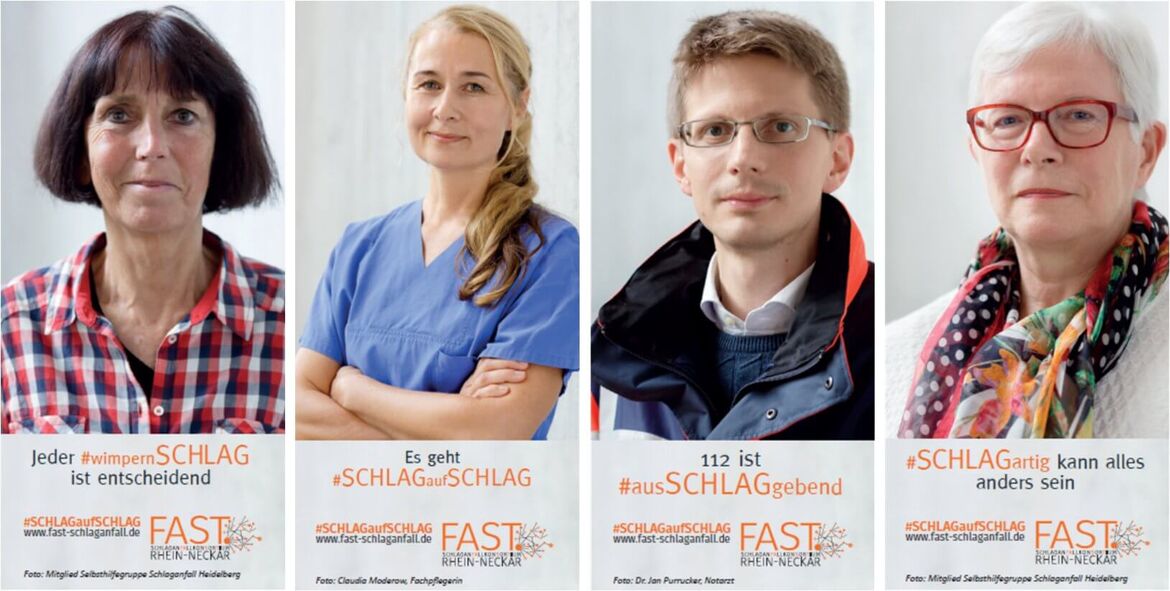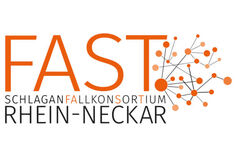The consortium
The sudden change in therapy standards for one of the most widespread diseases, acute stroke, brings considerable opportunities for those affected, but also major challenges for the structures of the healthcare system. On the one hand, centralised care structures must be created to ensure highly complex therapy for a growing number of patients, while on the other hand, regional attention and expertise must be developed to ensure efficient initial care and treatment. With the establishment of the SCHLAGANFALLKONSORTIUM RHEIN-NECKAR (FAST) , the best possible care is provided for a large number of patients - especially in regions outside of large centres. FAST links 20-30 partner centres in the region and integrates central and regional structures in order to provide treatment locally as often as possible and centrally whenever necessary. This gives all acute stroke patients the opportunity to be professionally assessed to determine whether they are eligible for recanalisation therapy and whether this can be implemented promptly.
You can download the FAST flyer here.
FAST - Stroke Consortium Rhine-Neckar
The FAST network for acute stroke care connects approximately 20-30 hospitals in the Rhine-Neckar region. FAST ensures that patients receive treatment locally whenever possible and centrally whenever necessary. The sudden change in therapy standards for one of the most widespread diseases, acute stroke, brings about considerable opportunities for the affected patients. However, it too brings about great challenges for the infrastructure of the health care system. On the one hand, central health care structures must be established to guarantee highly complex health care delivery for an increasing number of stroke patients. On the other hand, increased attention and expertise must be developed regionally to ensure efficient initial treatment. With the establishment of FAST, we aim to achieve the best possible treatment for a high number of affected patients, especially in regions outside of the catchment areas of specialised centres.

Flyer for download
Who we are
FAST is an association of 20-30 centres and clinics in the Rhine-Neckar region:
- Intervention centres: clinics that carry out both drug-based stroke acute therapy (thrombolysis) and mechanical stroke acute therapy (thrombectomy);
- Partner centres: Hospitals that only perform drug-based acute stroke therapy (thrombolysis);
- Cooperation centres: Centres without acute stroke treatment with a focus on aftercare and rehabilitation.
FAST is a network that consists of 20-30 hospitals in the Rhine-Neckar region:
- Intervention hospitals which are thrombolysis- and thrombectomy-capable;
- Partner hospitals which are thrombolysis-capable;
- Cooperation hospitals which do not provide acute stroke care but instead focus on after care and rehabilitation Services.
What are our goals?
Our goal is to measurably improve the care of people affected by acute stroke in the Rhine-Neckar region. Our care network aims to provide all those affected with the best stroke treatment based on the latest treatment recommendations at all times and regardless of where they live. The benchmark for this improvement is the reduction in the number of cases of disability and death as a result of a stroke.
Furthermore, FAST aims to demonstrate paradigmatically how the consequences of a widespread disease can be reduced, for example through the application of uniform care standards in all treatment phases of acute stroke, the structural improvement of the quality of care in the Rhine-Neckar region and the non-economically driven management of patient flows. We also focus on clinical and scientific networking so that all acute stroke patients have the opportunity to be professionally assessed to determine whether they are eligible for recanalisation therapy and whether this can be implemented promptly.
What are our goals?
We aim to achieve measurable improvements in the provision of acute stroke care to all stroke patients in the Rhine-Neckar region. Through our network all those affected by stroke will receive the best possible stroke treatment based on the most recent treatment recommendations - regardless of when and where their stroke occurred. We expect these improvements to be evidenced by a decrease in death and/or disability after stroke. In addition, we expect FAST to serve as an example of how the application of uniform care standards in all phases of stroke care, the structural increase in quality of care as well as the non-economic steering of patient flows can contribute to curbing the negative consequences of a widespread disease such as stroke.
How will we achieve our goals?
FAST establishes and integrates centralised and regional structures:
- Standardised and functional IT structures for the exchange of treatment-relevant data for rapid therapy decisions and a database for quality assurance and evaluation of the care network;
- Standard operating procedures (SOPs), e.g. for the pre-hospital phase, acute management in the emergency department, peri-interventional management and stroke unit/intensive care unit care;
- Sufficient capacity and logistics for the emergency services;
- A central coordination centre at the Heidelberg Neurological Clinic for coordinated and efficient communication and treatment paths, the development of SOPs and the establishment of a database;
- Structured further and advanced training for the specialist staff of the referring hospitals and the emergency services through training courses, work shadowing and guidelines;
- Public relations work through press work and a public awareness campaign in cooperation with local patient organisations.
We will reach our goals by establishing
- uniform and functional IT structures to exchange relevant patient data;
- standard operating procedures (SOPS) for the pre-hospital phase, acute care management at the emergency ward, peri-interventional management and stroke unit / intensive care;
- sufficient capacity and logistics for emergency medical services;
- a central coordination office at the Neurology Clinic Heidelberg;
- structured education of specialised staff and emergency medical staff; and
- a public awareness campaign.
Central coordination centre
The FAST Coordination Office serves to establish and coordinate harmonised and efficient communication and treatment paths between all FAST partner centres, to develop SOPs and to establish and maintain a dedicated database for scientific evaluation. The aims of this work are quality assurance, visibility, national and international dissemination of the results, establishment of treatment standards and supra-regional and national implementation of our experience. In addition, the FAST Coordination Centre coordinates the network's structured further and advanced training courses and public relations work.
The central FAST coordination office at Heidelberg University Hospital is headed by the Medical Directors of Neurology Prof. Dr Wolfgang Wick and Neuroradiology Prof. Dr Martin Bendszus as well as the Section Heads of Vascular Neurology Prof. Dr Peter Ringleb and Interventional Neuroradiology Dr Markus Möhlenbruch. The operational business of network coordination is supported by care coordinator Anja Ott.
Central Coordination Office
The FAST coordination office is responsible for the establishment and coordination of harmonised and efficient communication and treatment pathways between all hospitals participating in the FAST network, the development of Standardised Operating Procedures (SOPs), and the set-up and management of a scientific disease database. These activities serve the purposes of quality assurance, visibility via national and international dissemination of results as well as establishing standards and an inter-regional and national implementation of our experiences. In addition, the coordination office coordinates structured education programmes as well as the network's public awareness campaign.
The central coordination office at Heidelberg University Hospital is directed by the Medical Directors of the Departments of Neurology (Prof. Dr med. Wolfgang Wick) and Neuroradiology (Prof. Dr med. Martin Bendszus) as well as the Heads of the Sections of Vascular Neurology (Prof. Dr Peter Ringleb) and Interventional Neuroradiology (Dr Markus Möhlenbruch). The coordination office is operationally supported by Anja Ott.
